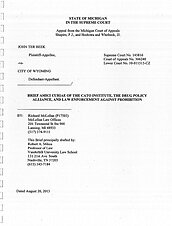Ter Beek v. City of Wyoming
Learn more about Cato’s Amicus Briefs Program.
In 2008, Michigan voters approved a ballot initiative that would allow certain qualifying patients to use marijuana for medical reasons (Michigan Medical Marihuana Act (MMMA)). In response to the enactment of MMMA, the City of Wyoming (defendant) enacted a local ban on medical marijuana within its city limits. John Ter Beek (plaintiff) is a qualifying patient under the MMMA and he would like to grow and use medical marijuana in his own home, which is located in the City of Wyoming. Ter Beek argues that the city ordinance is invalid because it is preempted by state law (MMMA). In response, the city claims that the MMMA is itself preempted by a federal law, the Controlled Substances Act, which bans the possession of marijuana outright. This amicus brief, jointly filed by Cato, the Drug Policy Alliance, and Law Enforcement Against Prohibition, urges the Supreme Court of Michigan to reject the City of Wyoming’s claim of federal preemption. Because the MMMA does not assist, require, or even pressure anyone to violate the federal law, it does not pose a preemptable conflict with federal law. Contrary to conventional wisdom, Congress cannot preempt state laws that merely permit private conduct that the federal government deems objectionable. The anti-commandeering doctrine prohibits the Congress from using the states as instruments of federal governance.
